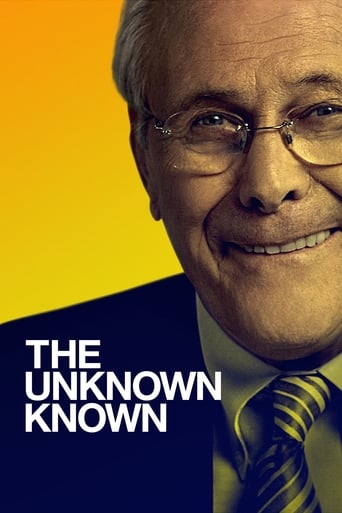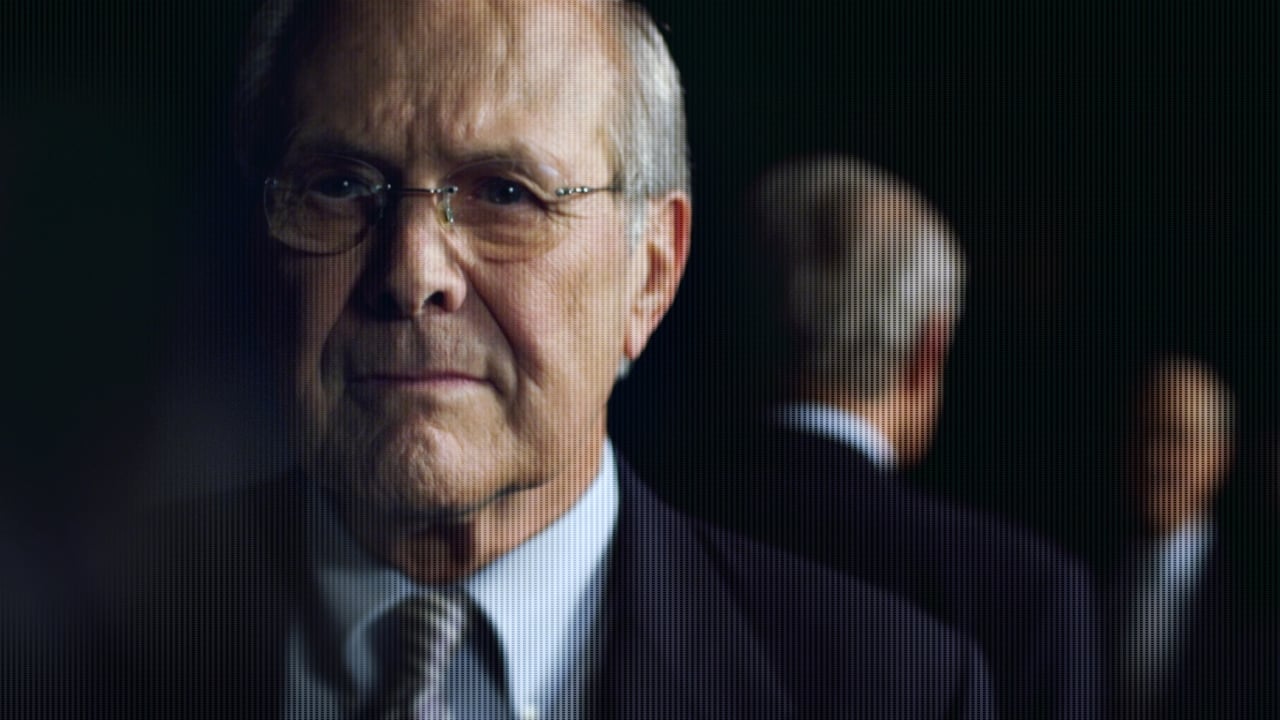hte-trasme
At the end of this film, Errol Morris asks its subject, Donald Rumsfeld, why he is participating in the film at all. The response he gets is, "I'll be damned if I know." Morris has a particular genius for drawing and highlighting themes from the raw, direct interview material of his subjects. And prominent here is Rumsfeld's unusual and apparently absolutely comfort with uncertainty. "You can't know with certainty, he tells us. "When you say, 'How could you know?' the answer is, 'You can't.'" In old press conference film he misquotes Hamlet to assert that "there are some things neither bad nor good but thinking makes them so." He assures us with a glib grin that "All generalizations are false -- including this one."But the film invites us to take note that Rumsfeld is not just comfortable with uncertainly, but comfortable with acting on that uncertainty in ways that lead to catastrophes like the Iraq War. For Rumsfeld, not only is absence of evidence that Saddam Hussein did have "weapons of mass destruction" not evidence that he did not -- but that lack of evidence that he did not is reason enough to go to war. Rumsfeld shows himself to be a dangerous man because not only is he aware that he can't reach absolute truth, he's profoundly incurious about approaching information that would approximate truth. Morris doesn't narrate, but his voice here is a prominent one. Rumsfeld, often terse, impossible to pin down, and obsessed with definitions, is engaged in dialog with his interviewer, who through both sharp and naif questions as well as eloquent imagery and editing presents a counter-narrative that neatly undermines Rumsfeld's. Over the course of about 100 minutes of listening to Donald Rumsfeld, he allows himself to show himself to us as deeply self-contradictory -- and deeply satisfied with acting in an examined way. This is a sharply intelligent and subtle film, dealing with and revealing a mystifying almost deliberately thoughtless subject.
Steve Pulaski
Donald Rumsfeld has the power to fascinate some, alienate and irritate others, but mesmerize many, which makes him the perfect person to sit before Errol Morris's trademark device known as "the Interrotron" and provide us with a wealth of information on his life as the U.S. Secretary of Defense during the birth and height of the War on Terror in America. Morris's "Interrotron" is a device that allows the subject to look through a two way mirror and see Errol Morris, with a camera the subject can't see being pointed at them. This allows for a more conversational approach to an interview, and because Morris is such a confident documentarian (especially in this case), his style and approach to his subjects allows for something more impressive and entertaining than your average "talking head" documentary.Immediately, any fan of Morris will compare The Unknown Known to his other film The Fog of War: Eleven Lessons from the Life of Robert S. McNamara, which showed Morris talking to U.S. Secretary of Defense Robert S. McNamara, who served during some of the most critical times in American history, like the Bay of Pigs crisis and the Vietnam War. McNamara was a subject who you didn't need to make talk, for he always seemed to be alive and interested in sharing his ideas and his experiences with Morris. On this hand, Rumsfeld feels more interested in trying to find easy answers and dodge some of Morris's most biting questions (including whether or not having the United States involve themselves in Iraq's affairs and eventually engaging in a war with them was justified or miscalculated).One can see Rumsfeld is a seasoned veteran when it comes down to giving cleverly-worded answers as opposed to straight ones. When looking to explain certain topics, Rumsfeld gets lost in cute words, unnecessary wording that's prime purpose is to be confusing (just look at the film's title, which is a direct quote from Rumsfeld himself), and inane sloganeering and simplifying. I was reminded of the documentary Nick Nolte: No Exit, where actor Nick Nolte decided to make a film about him interviewing himself in a weirdly-meta format. Nolte was less interested in answering the questions and more interested with simply talking around them, which made me question why he even bothered to make a documentary about interviewing himself when he was going to answer any questions he was going to ask himself in the first place. But at least Nolte didn't tack on a goofy and quietly infuriating grin at the end of his answers.Rumsfeld isn't that bad when compared to Nolte, however. After all, he doesn't take the hugely-questionable route of interviewing himself with the film, but he still finds ways to dodge clear answers to Morris's serious questions and finds ways to confuse himself, and the audience for that matter, throughout the documentary. For example, an early scene in the film involves Rumsfeld defining the four levels of "knowns" in the world. He tells us "known knowns" are things we know we know. He says "known unknowns" are things we know we don't know. He says "unknown unknowns" are things we know we don't know. And finally, he acknowledges the film's title and tells us "unknown knowns" are things we thought we knew but didn't. This ridiculous way of phrasing concepts will only further make political concepts more abstract to the politically ignorant, probably enforcing the reason why they're lost all the more.The concept of "knowns" came to be when Rumsfeld acknowledged the presence of weapons of mass-destruction (WMDs) in Irag in 2002 during a speech which went on to be known from the single line "there are known knowns." In other words, Rumsfeld was supremely confident that the then-ruler of Iraq Saddam Hussein was housing WMDs in Iraq and was up to no good. The Unknown Known explores Rumsfeld's duty as the Secretary of Defense during that time and the legacy he left on the cabinets he was employed under, Gerald Ford and George W. Bush, respectively. During his time, Rumsfeld came to be known as someone who wrote and issued the most memorandums to other officials he worked with. Rumsfeld states that just from working at The Pentagon for a relatively short time he issued over 20,000 memos, so in his lifetime, he had to have issued well over a million, so he claims.The Unknown Known is conducted at a brisk pace, with Morris's editing and confident filmmaking techniques taking prominence over Rumsfeld's detailed accounts on how it was to work in The Pentagon on the day of September 11, 2001 and his wishy-washy answers on methods of torture and the hugely controversial act of waterboarding. The one detail I noticed with the film is how Morris's editing seemed to play a bigger role than ever with this film to the point where I question whether or not Rumsfeld was dancing around questions or was Morris editing the interview together in such a strange way.Despite the film being easy to compare to Morris's The Fog of War, I find that the film could also easily be compared to one Morris's more recent efforts by the name of Tabloid, an underrated documentary concerning a former Miss Wyoming model who allegedly kidnapped and raped a Mormon missionary. I find both The Unknown Known and Tabloid to be two of a kind because they both show how people can come to their own conclusions and work hard to establish the truth that they want to believe. Even The Fog of War had truth-seeking undertones in the regard that it showed McNamara's perspective on certain issues, showing that history isn't so objective after all. If Errol Morris's films thus far have a moral to them that connects each one in some way, I'm pretty confident in saying I have found something within them all.Starring: Donald Rumsfeld. Directed by: Errol Morris.
Camoo
Famously rigorous filmmaker Errol Morris sits a subject in front of him and the subject won't budge. This is, unfortunately, the takeaway from this documentary - a tremendous disappointment of a film in some way, but an extraordinary documentation of psychosis in another. Rumsfeld apparently so annoyed Morris with his crafty replies that the director felt it necessary to follow up his film with a wild press tour apologizing for it - including a four part investigation into Rumsfeld's evasiveness in a New York times op-ed. In another article he called this film 'a horror movie'. And it's understandable. Those who were against the wars in Iraq and Afghanistan will be infuriated- it gives us no new answers as to the motives behind the wars, no candid insights into Rumsfeld's tenure, and instead presents us with the same smirking blur of a man that we all got to know from his press conferences. Without a glint of uncertainty in his eye, he repeats essentially the same shtick as he always has. Direct questions are deflected with a grin and a wave. Indeed, nobody deserves to be investigated more than Rumsfeld or his former compatriots, and Morris would ordinarily be the man to do it. But for an encounter to take place between two people, both need to be there. In this case one was absent. Those expecting a one on one - a whittling away towards the real substance - will leave empty handed because Rumsfeld is a ghost. There ain't nothing there. We've all been punk'd.
maxwalters30
I want to first say that I thought Errol Morris' previous film - the fog of war - was excellent. I am a fan of his style and also of his ambition to take on such large characters of history. However, I think he failed this last attempt quite dramatically. The movie was boring, redundant, un-insightful, and - worst of all - wasted an hour and a half of my life. In my opinion there are only a few reason why this turned out to be a failure: 1) Don is actually a pretty honest guy (but boring) and remembers quite a lot which takes Errol by surprise 2) Errol didn't pull the trigger on (i.e. address on camera) some big inconsistencies in his memos and his interviews 3) Errol goes into this thinking he has Don with the millions of memos and hours of interview time but then gets completely dismantled by Don in his questioning thus resulting in wasted time/filmWhile I cannot tell you which is true, the result is a failure by the director to really provide the audience any sort of substance for his money/time. I wish Errol would have either asked Don about more or not marketed the film as something a history buff may like. Lastly some of my many questions from the movie: Honestly, who really cares about how the words unknown and known are put together in a sentence?? Out of all the interesting stuff this man knows why did you consistently highlight (i.e. use film time for) the fact that hes a word freak and wrote millions of memos? So this guy is pedantic...we get it but who cares??? Why did you show hundreds of newspaper headlines but really not get the bottom of any of them? How did you not find one slip up in those millions of memos? Why did you choose Don if you knew how smart/clever/boring he was?Do yourself a favor and go watch fog of war and don't waste your time on this like the director did.




 AD
AD


